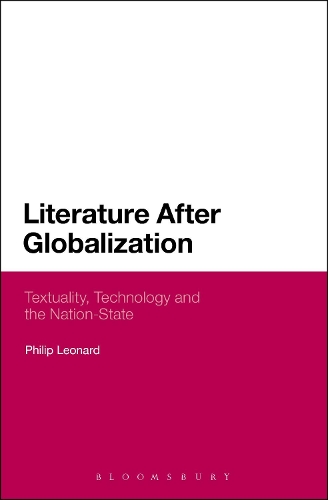
Literature After Globalization: Textuality, Technology and the Nation-State
(Hardback)
Available Formats
Publishing Details
Literature After Globalization: Textuality, Technology and the Nation-State
By (Author) Dr Philip Leonard
Bloomsbury Publishing PLC
Bloomsbury Academic USA
17th January 2013
United States
Classifications
Tertiary Education
Non Fiction
Literary studies: c 1900 to c 2000
Globalization
Literary studies: postcolonial literature
303.483
Winner of Choice Outstanding Academic Title 2015 (United States)
Physical Properties
Hardback
208
Width 156mm, Height 234mm
498g
Description
Choice Outstanding Academic Title 2014 Literature after Globalization offers a detailed study of recent literary and theoretical responses to technology, globalization, and national identity. Focusing on texts of the the 1990s and 2000s, particularly novels and other writing by Mark Danielewski, Hari Kunzru, Indra Sinha, and Neal Stephenson, it charts a departure from narratives of globalization which declare the collapse of national cultures, and it considers how national sovereignty has been reinvented and reasserted in the face of technology's transnational effects. Drawing upon recent theoretical responses to technology and culture (including work by Yochai Benkler, Manuel Castells, Gilles Deleuze, Jacques Derrida, N. Katherine Hayles, Paul Virilio, and McKenzie Wark) this book will explore how, in these novels, the notion of an inclusive globalization has been replaced by a sense of national globalism.
Reviews
Elegant, challenging and ambitious, Leonard's Literature after Globalization reads contemporary fiction in terms that ask broad questions about citizenship and national identity in the context of the messy fluidity and flux of our networked world. In the process, he generate a range of important insights into the nature of readership, identity and statehood at the start of the 21st century. -- James Annesley, Senior Lecturer in American Literature
Literature After Globalization is no doubt a thought-provoking study. -- Alison Gibbons * American Book Review *
Lenoard (Nottingham Trent Univ., UK) offers six chapters on five novels of globalization. He writes on Anglo-Indian Indra Sinhas The Cyber Gypsies (1999), a barely fictional memoir of the emergence of early multi-participant online communities. He explores Cryptonimicon (1999), one of the best works of the talented Neal Stephenson, in which the encryption of vast amounts of data is an active theme. Leonard offers perspicacious readings of the Anglo-India Hari Kunzrus compelling Transimssion (2004), which has a hacker as its protagonist, and of Mark Danielewskis Only Revolutions (2006), arguably not a novel but rather a multi-stranded 360-page meditation on open-ended contrsuctions of self from fragments of existing culture. A suggestive reading of the film Starship Troopers (1997), based on Robert Heinleins 1959 book of the same title, is also offered. Leonards cumulative representation of interfaces between contemporary literature and the digital doain is even more valuable than these find readings, as are his rapid yet learned and subtle comments on the work of major theorists. This is a rare achievement in the field of literature and globalization, a definite advance on even such competent works as James Annesleys Fictions of Globalization (2006) and Suman Guptas Globalization and Literature (CH, Oct09, 47-0689). Summing Up: Essential. Lower-division undergraduates through faculty. -- K.Tllyan, Wesleyan University * CHOICE *
Author Bio
Philip Leonard is Reader in Literary Studies and Critical Theory at Nottingham Trent University, UK. He is the author of Nationality between Poststructuralism and Postcolonial Theory: A New Cosmopolitanism (Palgrave, 2005).
